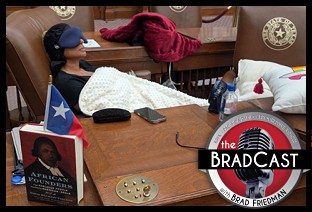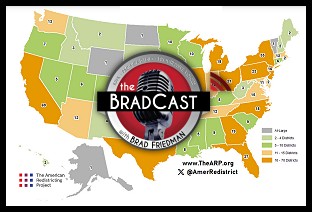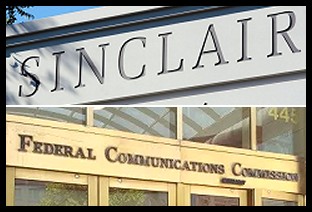 An investigation by the South Carolina Law Enforcement Division (SLED), the state's top law enforcement agency, has concluded that no charges will be filed against Alvin Greene, the mysterious and unverifiable winner of the Democratic Party's nomination for the U.S. Senate, in relation to the $10,440 filing fee the unemployed military vet paid to get onto the party's June 8th primary ballot.
An investigation by the South Carolina Law Enforcement Division (SLED), the state's top law enforcement agency, has concluded that no charges will be filed against Alvin Greene, the mysterious and unverifiable winner of the Democratic Party's nomination for the U.S. Senate, in relation to the $10,440 filing fee the unemployed military vet paid to get onto the party's June 8th primary ballot.
In that election, the unknown Greene was reported --- by the 100% unverifiable ES&S e-voting system --- to have defeated former four-term state legislator and U.S. Circuit Court Judge Vic Rawl 59% to 41% despite having failed to campaign for the nomination, nor even having a campaign website.
Questions have arisen as to how the jobless Greene, who was recently appointed a public defender in a felony obscenity case he faces, was able to afford the filing fee for the U.S. Senate race. As noted by Citizens for Responsibility and Ethics in Washington (CREW), which requested an investigation into the matter, Section 7-25-200 of the SC Code of Laws prohibits anyone from accepting or offering "either directly or indirectly, money, a loan of money, or any other thing of value...as inducement to file as a candidate for any state or federal election office." Greene, who lives with his father, maintains he used money saved from military pay to cover the fee.
Some, including both state Republicans and South Carolina's Democratic U.S. House Rep. James Clyburn (SC), have stated the possibility that Greene was a "plant" on the ballot, given a public poll taken in May, as cited by Rawl campaign manager Walter Ludwig here at The BRAD BLOG, just three weeks weeks before the election, which showed Rawl trailing SC's incumbent Republican Sen. Jim DeMint by just 7 points, 50 to 43%. However, even the "plant" theory can't explain Greene's nearly 20-point "victory" as reported in the June 8th election results.
It's the very last paragraph of CNN's report on SLED clearing Greene, however, which, for the moment, raises both our eyebrow and, possibly, a curious red flag in the results of the Republican-controlled state's investigation into Greene's filing fee...
Without having subpoenaed Green's bank records to determine if he really did save up those funds as he claims, how does the state know where the money came from?
According to AP's report, which also notes that the law enforcement agency did not subpoena Greene's bank records, SLED Chief Reggie Lloyd tells says that Greene cooperated with investigators, apparently allowing them to review his bank records in some fashion:
The records matched Greene's story that the 32-year-old candidate, who has been collecting unemployment benefits since he left the military in August, was able to afford the fee because he saved his money and lived frugally.
"He clearly does not have someone paying him. He just decided to take his money and run for U.S. Senate. There's no big conspiracy," Lloyd said.
Greene said Friday that SLED's findings vindicated him.
"It was just as I said: It came from the Army," Greene said Friday. "I'm happy."
The investigation, however, and the failure to subpoena bank records, has failed to satisfy everyone, including a Republican state lawmaker, as AP reports:
Rep. Chip Limehouse, the state lawmaker who asked state police to investigate, says he's not satisfied with their probe and will continue to ask questions about where Greene got the money for his filing fee.
"Did the $10,400 fall out of the sky?" the Republican from Charleston asked Friday. "This doesn't clear it up for me."
 For his part, Rawl has largely not focused on the curious circumstances behind Greene's appearance on the ballot. Instead, he has focused on what he describes as "systemic software problems" on the oft-failed, easily-hacked ES&S voting system as the reason for Greene's otherwise inexplicable win, even as he was not allowed by the company or state officials to examine the machines or tabulators prior to their being scrubbed for state run-off elections just ten days after the June 8th election.
For his part, Rawl has largely not focused on the curious circumstances behind Greene's appearance on the ballot. Instead, he has focused on what he describes as "systemic software problems" on the oft-failed, easily-hacked ES&S voting system as the reason for Greene's otherwise inexplicable win, even as he was not allowed by the company or state officials to examine the machines or tabulators prior to their being scrubbed for state run-off elections just ten days after the June 8th election.
A number of statistical and election integrity experts have cited the "staggering" disparities in the 11-point difference between paper-based absentee results in the election and those from the unverifiable touch-screen voting machines used on Election Day, describing what they see as "clear signs of election fraud."
Following the race, and a five-hour hearing on his election protest before the Executive Board of the state's Democratic Party two weeks ago, Rawl has been outspoken about the problems with South Carolina's unverifiable voting system. "The issues we raised about the lack of election integrity in South Carolina are real," he said in a recent statement, "and they are not going away unless people act."
[Our recent exclusive live interview with Rawl on the Mike Malloy Show can be heard here. Greene did not respond to our repeated requests for an interview.]


 Sunday 'Random Acts of' Toons
Sunday 'Random Acts of' Toons From CA's 'Nuclear Deterrence' Map to Newsom's Trolling to Trump's 'Fascist Theatre' and Beyond: 'BradCast' 8/21/25
From CA's 'Nuclear Deterrence' Map to Newsom's Trolling to Trump's 'Fascist Theatre' and Beyond: 'BradCast' 8/21/25 'Green News Report' 8/21/25
'Green News Report' 8/21/25
 On 'Americanism' and Trump's 'Stalinesque' Plot to Whitewash U.S. History: 'BradCast' 8/20/25
On 'Americanism' and Trump's 'Stalinesque' Plot to Whitewash U.S. History: 'BradCast' 8/20/25  Texas GOP Imprisons Dem State Lawmaker in State House Chamber: 'BradCast' 8/19/25
Texas GOP Imprisons Dem State Lawmaker in State House Chamber: 'BradCast' 8/19/25 'Green News Report' 8/19/25
'Green News Report' 8/19/25 Trump, Nazis and
Trump, Nazis and  Sunday '
Sunday ' Newsom's 'Election Rigging Response Act'; FCC's License Renewal for Sock-Puppeting Sinclair: 'BradCast' 8/14/25
Newsom's 'Election Rigging Response Act'; FCC's License Renewal for Sock-Puppeting Sinclair: 'BradCast' 8/14/25 'Green News Report' 8/14/25
'Green News Report' 8/14/25 140 New House Reps?: Moving Beyond the Gerrymandering Wars: 'BradCast' 8/13/25
140 New House Reps?: Moving Beyond the Gerrymandering Wars: 'BradCast' 8/13/25 FCC Renews Sinclair TV Licenses Despite Complaint from Petitioner Who Died Waiting
FCC Renews Sinclair TV Licenses Despite Complaint from Petitioner Who Died Waiting It's Not About the Rule of Law, It's About Authoritarian Control: 'BradCast' 8/12/25
It's Not About the Rule of Law, It's About Authoritarian Control: 'BradCast' 8/12/25 'Green News Report' 8/12/25
'Green News Report' 8/12/25 After Vaccine Cancels, CDC Shooting, Former Officials Want RFK Out: 'BradCast' 8/11/25
After Vaccine Cancels, CDC Shooting, Former Officials Want RFK Out: 'BradCast' 8/11/25 Sunday 'All's Well' Toons
Sunday 'All's Well' Toons 'Green News Report' 8/7/25
'Green News Report' 8/7/25 Trump Wars Against Greem Energy, Democracy on VRA's 60th: 'BradCast' 8/7
Trump Wars Against Greem Energy, Democracy on VRA's 60th: 'BradCast' 8/7 Media Conglomerates Continue Trump Capitulation: 'BradCast' 8/6/25
Media Conglomerates Continue Trump Capitulation: 'BradCast' 8/6/25 Banana Republican: Trump Shoots the Labor Statistics Messenger: 'BradCast' 8/5/25
Banana Republican: Trump Shoots the Labor Statistics Messenger: 'BradCast' 8/5/25 All's Fair in Love, War and, Apparently, Part-isan Gerrymandering: 'BradCast' 8/4/25
All's Fair in Love, War and, Apparently, Part-isan Gerrymandering: 'BradCast' 8/4/25 The Art of the Corrupt, Phony, Unlawful, Pretend Trade Deal: 'BradCast' 7/31/25
The Art of the Corrupt, Phony, Unlawful, Pretend Trade Deal: 'BradCast' 7/31/25 Battle Begins Against Trump EPA Climate Regulations 'Kill Shot': 'BradCast' 7/30/25
Battle Begins Against Trump EPA Climate Regulations 'Kill Shot': 'BradCast' 7/30/25 A Pu Pu Platter of Trump Corruption: 'BradCast' 7/29/25
A Pu Pu Platter of Trump Corruption: 'BradCast' 7/29/25 'Catastrophic' GOP Cuts to Medicaid, Medicare, ACA: 'BradCast' 7/28/25
'Catastrophic' GOP Cuts to Medicaid, Medicare, ACA: 'BradCast' 7/28/25
 VA GOP VOTER REG FRAUDSTER OFF HOOK
VA GOP VOTER REG FRAUDSTER OFF HOOK Criminal GOP Voter Registration Fraud Probe Expanding in VA
Criminal GOP Voter Registration Fraud Probe Expanding in VA DOJ PROBE SOUGHT AFTER VA ARREST
DOJ PROBE SOUGHT AFTER VA ARREST Arrest in VA: GOP Voter Reg Scandal Widens
Arrest in VA: GOP Voter Reg Scandal Widens ALL TOGETHER: ROVE, SPROUL, KOCHS, RNC
ALL TOGETHER: ROVE, SPROUL, KOCHS, RNC LATimes: RNC's 'Fired' Sproul Working for Repubs in 'as Many as 30 States'
LATimes: RNC's 'Fired' Sproul Working for Repubs in 'as Many as 30 States' 'Fired' Sproul Group 'Cloned', Still Working for Republicans in At Least 10 States
'Fired' Sproul Group 'Cloned', Still Working for Republicans in At Least 10 States FINALLY: FOX ON GOP REG FRAUD SCANDAL
FINALLY: FOX ON GOP REG FRAUD SCANDAL COLORADO FOLLOWS FLORIDA WITH GOP CRIMINAL INVESTIGATION
COLORADO FOLLOWS FLORIDA WITH GOP CRIMINAL INVESTIGATION CRIMINAL PROBE LAUNCHED INTO GOP VOTER REGISTRATION FRAUD SCANDAL IN FL
CRIMINAL PROBE LAUNCHED INTO GOP VOTER REGISTRATION FRAUD SCANDAL IN FL Brad Breaks PA Photo ID & GOP Registration Fraud Scandal News on Hartmann TV
Brad Breaks PA Photo ID & GOP Registration Fraud Scandal News on Hartmann TV  CAUGHT ON TAPE: COORDINATED NATIONWIDE GOP VOTER REG SCAM
CAUGHT ON TAPE: COORDINATED NATIONWIDE GOP VOTER REG SCAM CRIMINAL ELECTION FRAUD COMPLAINT FILED AGAINST GOP 'FRAUD' FIRM
CRIMINAL ELECTION FRAUD COMPLAINT FILED AGAINST GOP 'FRAUD' FIRM RICK SCOTT GETS ROLLED IN GOP REGISTRATION FRAUD SCANDAL
RICK SCOTT GETS ROLLED IN GOP REGISTRATION FRAUD SCANDAL VIDEO: Brad Breaks GOP Reg Fraud Scandal on Hartmann TV
VIDEO: Brad Breaks GOP Reg Fraud Scandal on Hartmann TV RNC FIRES NATIONAL VOTER REGISTRATION FIRM FOR FRAUD
RNC FIRES NATIONAL VOTER REGISTRATION FIRM FOR FRAUD EXCLUSIVE: Intvw w/ FL Official Who First Discovered GOP Reg Fraud
EXCLUSIVE: Intvw w/ FL Official Who First Discovered GOP Reg Fraud GOP REGISTRATION FRAUD FOUND IN FL
GOP REGISTRATION FRAUD FOUND IN FL

































